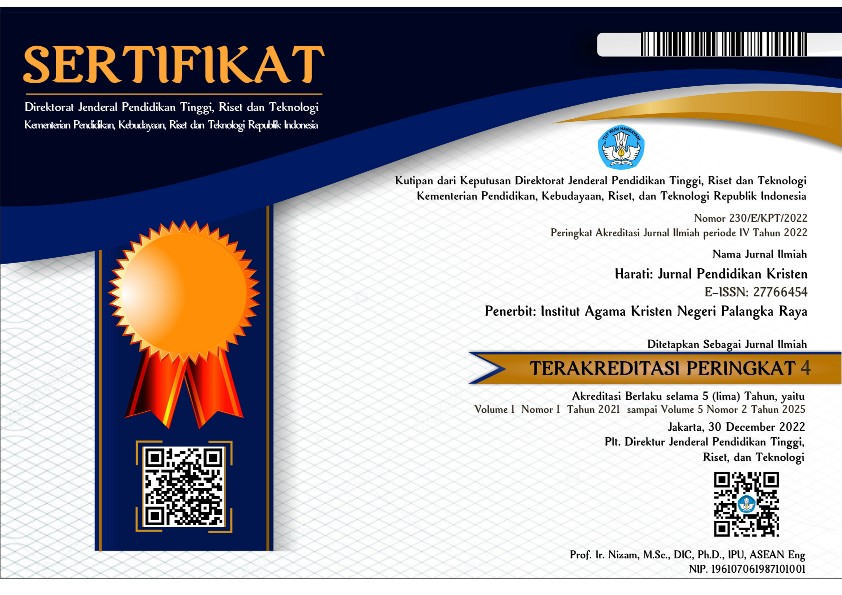Strategi Pembelajaran Menggunakan Metode Pembelajaran Berbasis Permainan dengan Media Pembelajaran Quizizz
DOI:
https://doi.org/10.54170/harati.v4i1.367Keywords:
learning media, learning strategy, quizizzAbstract
The use of strategies in the learning process is a must to facilitate the achievement of optimal results. A successful learning process requires conditions that do not stress students, and this is the reason why a strategy is important in its role in achieving good learning outcomes in the classroom. A teacher can sometimes lose direction, the trigger for which is very clear, namely without a clear strategy in the learning process, and the goals set at the beginning of the lecture are certainly difficult to achieve. In the context of classroom learning, the use of learning media becomes very important. Every learning media used today has various types, forms, or models, including audio, visual, and motion. The aim of this research carried out by researchers is to discover and explain the use of one of the multimedia learning media which is packaged in the form of games and is free, namely the Quizizz platform, which is a learning technology implemented in Christian leadership courses. Simply put, the aim of using this learning media is so that each student has a greater opportunity to interact, absorb and understand what is conveyed by the lecturer. Researchers conducted descriptive qualitative research through direct observation, individual interviews, and literature study. The aim of this research carried out by researchers was to find out how effective the use of Quizizz! as an alternative as a varied learning medium in the classroom and creates a pleasant learning atmosphere in the classroom, and the results of this research show that students can more easily absorb the material in learning Christian leadership courses through the use of the Quizizz! The results of this research provide a significant contribution to higher education institutions in implementing innovative digital learning.
References
Sugiyono. Metode Penelitian Kombinasi (Mix Methods). (Bandung: Alfabeta), 141.
Sarwono. J. Metode Penelitian Kuantitatif dan Kualitatif. (Yogyakarta :Graha Ilmu, 2006), 26
Sugiyono. Metode Penelitian Kombinasi (Mix Methods). (Bandung: Alfabeta, 2015), 140.
Miles dan Huberman. Analisis dan Kualitatif, (Jakarta: Universitas Press, 1992), 16.
Johnson, D. W., Johnson, R. T., & Smith, K. A. (2014). Cooperative learning: Improving university instruction by basing practice on validated theory. Journal on Excellence in College Teaching, 25(3-4), 85-118.
Means, B., Toyama, Y., Murphy, R., & Baki, M. (2013). The effectiveness of online and blended learning: A meta-analysis of the empirical literature. Teachers College Record, 115(3), 1-47.
Garrison, D. R., & Kanuka, H. (2004). Blended learning: Uncovering its transformative potential in higher education. Internet and Higher Education, 7(2), 95-105.
Tomlinson, C. A. (2001). How to differentiate instruction in mixed-ability classrooms. ASCD.
Keengwe, J. (2007). Faculty integration of technology into instruction and students' perceptions of computer technology to improve student learning. Journal of Information Technology Education, 6(1), 169-180.
Blumenfeld, P. C., Soloway, E., Marx, R. W., Krajcik, J. S., Guzdial, M., & Palincsar, A. (1991). Motivating project-based learning: Sustaining the doing, supporting the learning. Educational psychologist, 26(3-4), 369-398.
Black, P., & Wiliam, D. (1998). Assessment and classroom learning. Assessment in Education: Principles, Policy & Practice, 5(1), 7-74.
Clark, R. C., & Mayer, R. E. (2016). E-Learning and the Science of Instruction: Proven Guidelines for Consumers and Designers of Multimedia Learning. John Wiley & Sons.
Höffler, T. N., & Leutner, D. (2007). Instructional Animation Versus Static Pictures: A Meta-Analysis. Learning and Instruction, 17(6), 722-738.
Tallvid, M. (2017). Digital Technology as Affordance and Barrier in Higher Education. Education and Information Technologies, 22(2), 625-642.
Steinkuehler, C., & Duncan, S. (2008). Scientific Habits of Mind in Virtual Worlds. Journal of Science Education and Technology, 17(6), 530-543.
Gee, J. P. (2003). What Video Games Have to Teach Us About Learning and Literacy. Computers in Entertainment, 1(1), 20.
Hamari, J., Koivisto, J., & Sarsa, H. (2014). Does Gamification Work?--A Literature Review of Empirical Studies on Gamification. 2014 47th Hawaii International Conference on System Sciences.
Papastergiou, M. (2009). Digital Game-Based Learning in high school Computer Science education: Impact on educational effectiveness and student motivation. Computers & Education, 52(1), 1-12.







